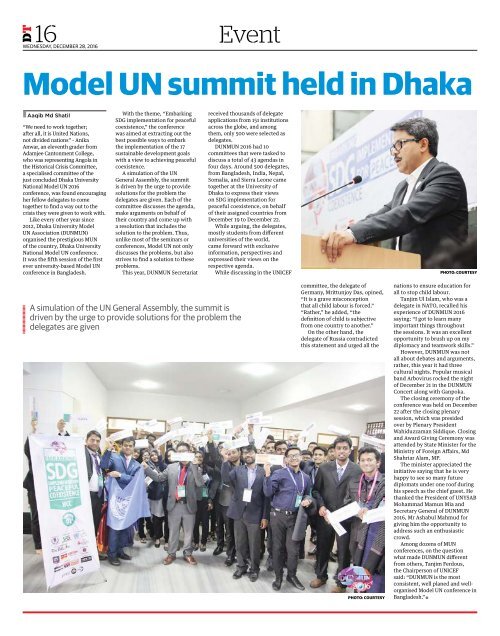e_Paper_Wednesday_December 12, 2016
Create successful ePaper yourself
Turn your PDF publications into a flip-book with our unique Google optimized e-Paper software.
16<br />
WEDNESDAY, DECEMBER 28, <strong>2016</strong><br />
DT<br />
Event<br />
Model UN summit held in Dhaka<br />
• Aaqib Md Shatil<br />
“We need to work together;<br />
after all, it is United Nations,<br />
not divided nations” - Anika<br />
Anwar, an eleventh grader from<br />
Adamjee Cantonment College,<br />
who was representing Angola in<br />
the Historical Crisis Committee,<br />
a specialised committee of the<br />
just concluded Dhaka University<br />
National Model UN <strong>2016</strong><br />
conference, was found encouraging<br />
her fellow delegates to come<br />
together to find a way out to the<br />
crisis they were given to work with.<br />
Like every other year since<br />
20<strong>12</strong>, Dhaka University Model<br />
UN Association (DUNMUN)<br />
organised the prestigious MUN<br />
of the country, Dhaka University<br />
National Model UN conference.<br />
It was the fifth session of the first<br />
ever university-based Model UN<br />
conference in Bangladesh.<br />
With the theme, “Embarking<br />
SDG implementation for peaceful<br />
coexistence,” the conference<br />
was aimed at extracting out the<br />
best possible ways to embark<br />
the implementation of the 17<br />
sustainable development goals<br />
with a view to achieving peaceful<br />
coexistence.<br />
A simulation of the UN<br />
General Assembly, the summit<br />
is driven by the urge to provide<br />
solutions for the problem the<br />
delegates are given. Each of the<br />
committee discusses the agenda,<br />
make arguments on behalf of<br />
their country and come up with<br />
a resolution that includes the<br />
solution to the problem. Thus,<br />
unlike most of the seminars or<br />
conferences, Model UN not only<br />
discusses the problems, but also<br />
strives to find a solution to these<br />
problems.<br />
This year, DUNMUN Secretariat<br />
received thousands of delegate<br />
applications from 151 institutions<br />
across the globe, and among<br />
them, only 500 were selected as<br />
delegates.<br />
DUNMUN <strong>2016</strong> had 10<br />
committees that were tasked to<br />
discuss a total of 43 agendas in<br />
four days. Around 500 delegates,<br />
from Bangladesh, India, Nepal,<br />
Somalia, and Sierra Leone came<br />
together at the University of<br />
Dhaka to express their views<br />
on SDG implementation for<br />
peaceful coexistence, on behalf<br />
of their assigned countries from<br />
<strong>December</strong> 19 to <strong>December</strong> 22.<br />
While arguing, the delegates,<br />
mostly students from different<br />
universities of the world,<br />
came forward with exclusive<br />
information, perspectives and<br />
expressed their views on the<br />
respective agenda.<br />
While discussing in the UNICEF<br />
PHOTO: COURTESY<br />
A simulation of the UN General Assembly, the summit is<br />
driven by the urge to provide solutions for the problem the<br />
delegates are given<br />
committee, the delegate of<br />
Germany, Mrittunjoy Das, opined,<br />
“It is a grave misconception<br />
that all child labour is forced.”<br />
“Rather,” he added, “the<br />
definition of child is subjective<br />
from one country to another.”<br />
On the other hand, the<br />
delegate of Russia contradicted<br />
this statement and urged all the<br />
PHOTO: COURTESY<br />
nations to ensure education for<br />
all to stop child labour.<br />
Tanjim Ul Islam, who was a<br />
delegate in NATO, recalled his<br />
experience of DUNMUN <strong>2016</strong><br />
saying: “I got to learn many<br />
important things throughout<br />
the sessions. It was an excellent<br />
opportunity to brush up on my<br />
diplomacy and teamwork skills.”<br />
However, DUNMUN was not<br />
all about debates and arguments,<br />
rather, this year it had three<br />
cultural nights. Popular musical<br />
band Arbovirus rocked the night<br />
of <strong>December</strong> 21 in the DUNMUN<br />
Concert along with Ganpoka.<br />
The closing ceremony of the<br />
conference was held on <strong>December</strong><br />
22 after the closing plenary<br />
session, which was presided<br />
over by Plenary President<br />
Wahiduzzaman Siddique. Closing<br />
and Award Giving Ceremony was<br />
attended by State Minister for the<br />
Ministry of Foreign Affairs, Md<br />
Shahriar Alam, MP.<br />
The minister appreciated the<br />
initiative saying that he is very<br />
happy to see so many future<br />
diplomats under one roof during<br />
his speech as the chief guest. He<br />
thanked the President of UNYSAB<br />
Mohammad Mamun Mia and<br />
Secretary General of DUNMUN<br />
<strong>2016</strong>, Mr Ashabul Mahmud for<br />
giving him the opportunity to<br />
address such an enthusiastic<br />
crowd.<br />
Among dozens of MUN<br />
conferences, on the question<br />
what made DUNMUN different<br />
from others, Tanjim Ferdous,<br />
the Chairperson of UNICEF<br />
said: “DUNMUN is the most<br />
consistent, well planed and wellorganised<br />
Model UN conference in<br />
Bangladesh.”•


















